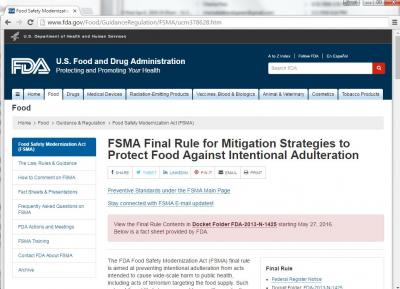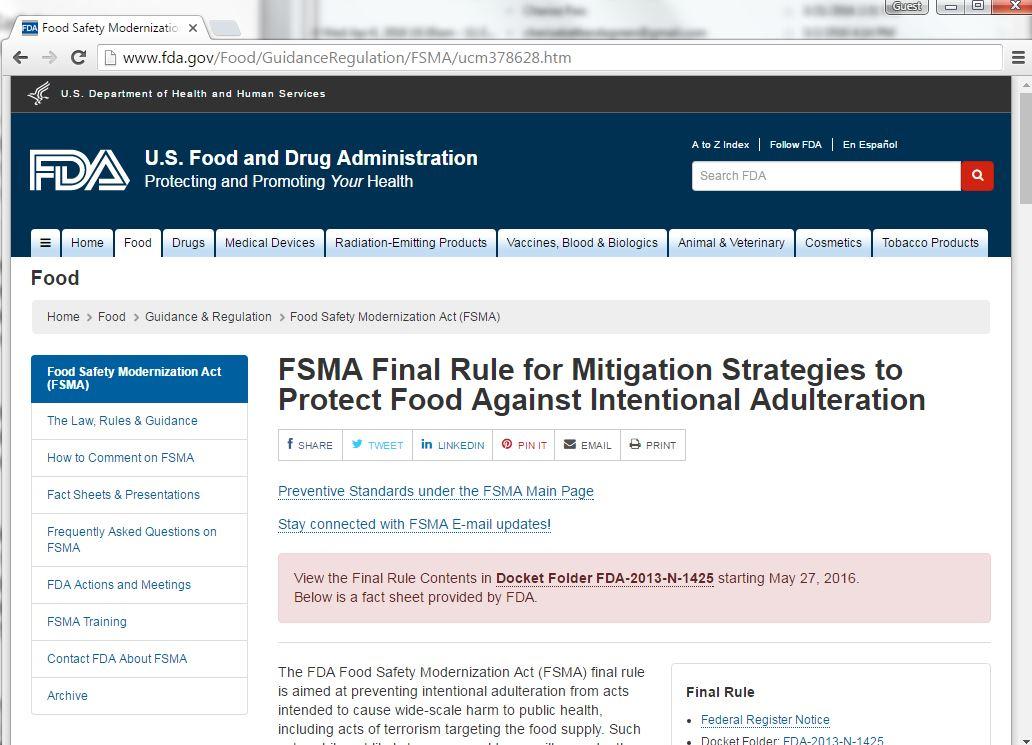The Food and Drug Administration (FDA) has released the final rule of the Food Safety Modernization Act, and its aim is to prevent the intentional adulteration of food leading to contamination. The legal term “adulteration” refers to failing to meet government standards—typically it is applied in cases of noncompliance with FDA or United States Department of Agriculture (USDA) standards. Therefore intentional adulteration refers to cases of purposeful noncompliance, often with the intent to cause public harm. In a summary, the FDA states that, “Such acts, while not likely to occur, could cause illness, death, economic disruption of the food supply absent mitigation strategies.”
The intentional adulteration provisions establish a variety of food defense measures, meant to improve national food security from those who may wish to cause public harm. For the first time, all food companies will be required to prepare and implement a written food defense plan. The plan must identify vulnerabilities and process steps, mitigation strategies, and procedures for food defense monitoring. Additionally, new requirements regarding training and recordkeeping were part of the final rule.
The rule is meant primarily for large businesses, whose volume of products sold has the potential to pose a serious public health threat, should intentional adulteration occur. Very small businesses, some holding companies, some packaging companies, and farms are not included in this rule.
The Food Safety Modernization Act (FMSA) was signed into law by President Obama in January 2011—largely in response to a concerning number of high-profile food-borne outbreaks in preceding years—and aims to ensure the safety of the U.S. food supply by focusing on preventing contamination, rather than responding to it. Since being signed into law, the FDA has made seven final rules regarding the provisions of FSMA, concluding with this final rule regarding intentional adulteration.
The rule will take affect 60 days after its publication in the Federal Register, which took place on May 27, 2016. Companies will have three years from the date the rule takes affect to comply with the new provisions, and smaller businesses may have an additional year to comply.
While the FDA attempts to control adulteration, it should be noted that many food additives that are considered safe by the FDA, might not be things you want to eat. We previously reported that cellulose, which is made from wood pulp, is actually permitted by the FDA as a food additive, and is used in most store-bought Parmesan cheeses. And although they are not included in this rule, adulteration—intentional or unintentional—can happen on farms as well, making it as important as ever to visit local farms, participate in farm tours, and actually get to know your farmers. Knowing your farmer is the best way, and by far the most effective way, to really know your food.
What do you think? Are you worried about contamination in the food supply? Do you try to know your farmer in order to avoid it? Let us know!
The intentional adulteration provisions establish a variety of food defense measures, meant to improve national food security from those who may wish to cause public harm. For the first time, all food companies will be required to prepare and implement a written food defense plan. The plan must identify vulnerabilities and process steps, mitigation strategies, and procedures for food defense monitoring. Additionally, new requirements regarding training and recordkeeping were part of the final rule.
The rule is meant primarily for large businesses, whose volume of products sold has the potential to pose a serious public health threat, should intentional adulteration occur. Very small businesses, some holding companies, some packaging companies, and farms are not included in this rule.
The Food Safety Modernization Act (FMSA) was signed into law by President Obama in January 2011—largely in response to a concerning number of high-profile food-borne outbreaks in preceding years—and aims to ensure the safety of the U.S. food supply by focusing on preventing contamination, rather than responding to it. Since being signed into law, the FDA has made seven final rules regarding the provisions of FSMA, concluding with this final rule regarding intentional adulteration.
The rule will take affect 60 days after its publication in the Federal Register, which took place on May 27, 2016. Companies will have three years from the date the rule takes affect to comply with the new provisions, and smaller businesses may have an additional year to comply.
While the FDA attempts to control adulteration, it should be noted that many food additives that are considered safe by the FDA, might not be things you want to eat. We previously reported that cellulose, which is made from wood pulp, is actually permitted by the FDA as a food additive, and is used in most store-bought Parmesan cheeses. And although they are not included in this rule, adulteration—intentional or unintentional—can happen on farms as well, making it as important as ever to visit local farms, participate in farm tours, and actually get to know your farmers. Knowing your farmer is the best way, and by far the most effective way, to really know your food.
What do you think? Are you worried about contamination in the food supply? Do you try to know your farmer in order to avoid it? Let us know!






